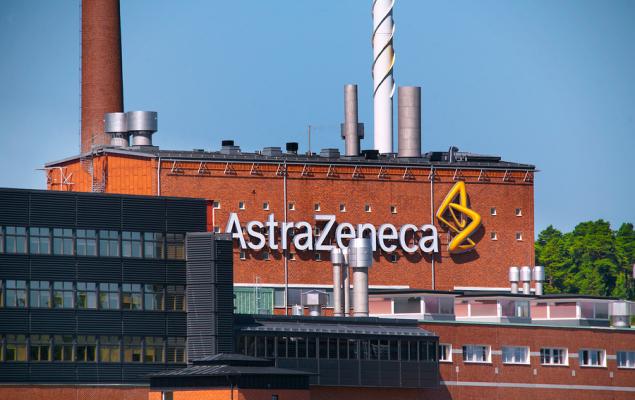3 Big Drugmakers To Buy Ahead Of The Q2 Earnings Season

Image: Bigstock
The big drug companies are set for the second-quarter earnings season, which begins later this month. Though the second-quarter results are likely to reflect the continued negative impact from the pandemic, trends are expected to be better as economies have re-opened and vaccinations continue in full swing.
Importantly, a number of big drugmakers, including Pfizer and AstraZeneca, have seen a surge in their sales after getting emergency approvals for their COVID-19 vaccines, a trend expected to have continued in the second quarter.
Overall, the drug/biotech industry continues to witness developments and improvements in drug research in 2021 while withstanding the impact of the pandemic remarkably well. While development updates related to COVID-19 medicines/vaccines continued have taken center stage this year as well, the sector also witnessed positive developments in other innovative pipeline areas.
Here we have highlighted three bigshot drugmakers, AstraZeneca (AZN Quick Quote AZN - Free Report), AbbVie (ABBV Quick Quote ABBV - Free Report), and Bayer (BAYRY Quick Quote BAYRY - Free Report), which can prove to be good additions to improve your portfolio’s health as all three have a Zacks Rank #2 (Buy).
A chart showing the share price movement of these companies this year so far is given below.

Image Source: Zacks Investment Research
AstraZeneca
AstraZeneca’s stock has risen 21.6% this year so far. Its earnings estimates for 2022 have gone up from $3.24 per share to $3.25 per share over the past 60 days.
Incidentally, AstraZeneca has faced quite a lot of troubles related to its COVID-19 vaccine’s use and COVID-19 drug development efforts this year. A possible link between AstraZeneca’s COVID-19 vaccine and rare blood clot events in the brain of the people who have received the shot have been found by regulatory authorities. In March, many European countries had temporarily paused vaccinations with AstraZeneca’s jab due to the blood clot controversies. Though most countries resumed vaccinations later on, some countries, however, restricted its use in younger people. Separately, data released last month, showed that AstraZeneca's investigational antibody cocktail for COVID-19, AZD7442 failed to prevent people who were already infected from developing symptomatic COVID-19.
Nonetheless, it has been a good first half for AstraZeneca as far as its other pipeline efforts are concerned. In January, its innovative cancer drug, Enhertu, developed in collaboration with Daiichi Sankyo, was approved for its second indication, HER2+, metastatic gastric cancer. Its blockbuster diabetes medicine, Farxiga was approved for another indication, chronic kidney disease (CKD), in April 2021. Importantly, its COVID-19 vaccine, developed in collaboration with the University of Oxford, is approved for temporary/conditional use in several countries in less than a year from when they signed the agreement to jointly develop. The vaccine increased its total sales in the first quarter of 2021.
Moreover, its newer oncology medicines such as Tagrisso, Lynparza, and Imfinzi are driving the company’s sales, making up for the decline in the Respiratory & Immunology franchise.
AstraZeneca is also due to acquiring a rare-disease drugmaker and S&P component, Alexion. With the acquisition, the company aims to develop its immunology business further. The acquisition is expected to close in the third quarter of 2021.
AbbVie
AbbVie’s stock is up 7.4% this year so far. Estimates for 2021 earnings have increased from $12.59 to $12.60 per share in the past 60 days while that for 2022 have risen from $13.96 to $14.00 over the same period
AbbVie has been successful in expanding labels of its cancer drugs, Imbruvica and Venclexta. AbbVie has built a substantial oncology franchise with Imbruvica and Venclexta, which have become key contributors to sales growth.
Its two new immunology drugs, Skyrizi and Rinvoq, are also performing beyond expectations. With many new indications coming in the next couple of years, sales of these drugs could be higher and have the potential to replace Humira when generics are launched in 2023.
It has an impressive late-stage pipeline with several early/mid-stage candidates that have blockbuster potential. AbbVie expects approval of more than a dozen new products/line extensions for major indications over the next two years, which can collectively add meaningful revenue growth in advance of the U.S. Humira loss of exclusivity in 2023.
Bayer
Bayer’s stock is up 3.6% this year so far. Estimates for Bayer’s 2021 earnings have increased from $1.74 to $1.81 per share in the past 60 days while that for 2022 have risen from $1.89 to $2.00 over the same period
Bayer’s Crop Science division is demonstrating an encouraging sales performance amid an improving market environment. Sales in Bayer’s Pharmaceuticals unit have remained steady driven by strong sales of its partnered medicines, oral anticoagulant Xarelto and eye drug Eylea. Bayer’s Consumer Health division has outperformed the competition.
The company is undertaking several initiatives to strengthen its position across portfolios, including the divestiture of the Animal Health business unit and the Consumer Health brands — Coppertone and Dr. Scholl’s. Bayer also sold its 60% interest in Germany-based site services provider, Currenta. Moreover, the recent acquisition of Asklepios will strengthen Bayer’s cell and gene therapy platform. Restructuring initiatives should help the bottom line.
Disclaimer: Neither Zacks Investment Research, Inc. nor its Information Providers can guarantee the accuracy, completeness, timeliness, or correct sequencing of any of the Information on the Web ...
more


